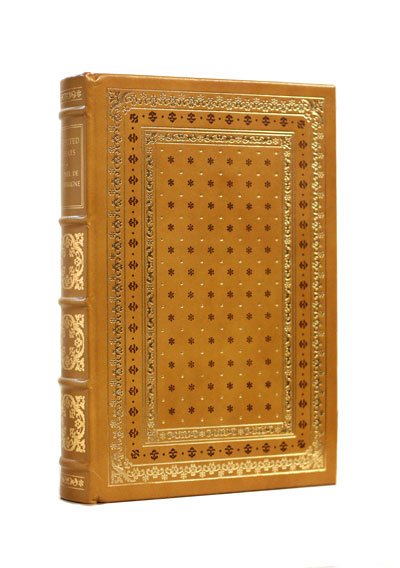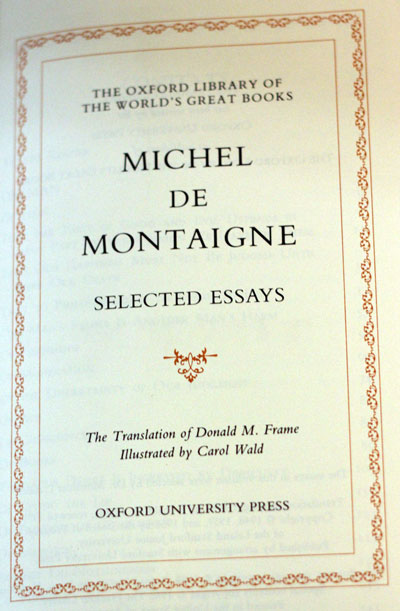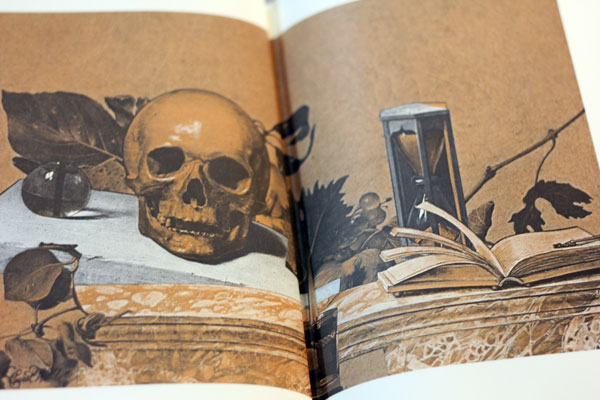About this edition:
This book is a triumph of book design and bookbinding, meant to last for generations. It features:
- Full top-grade leather binding
- Genuine 22k gold gilt to all edges, front design, spine, and back
- Marbled endsheets
- Satin bookmark, sewn-in
- Hubbed spine with raised bands
- Smyth-sewn binding for durability
- Premium acid-neutral archival paper that will not yellow
A writeup by a book collector at Librarything.com:
OXFORD UNIVERSITY PRESS AND FRANKLIN MINT: One Brief, Shining Moment
The Franklin Library, the publishing division of The Franklin Mint, was of course, at one time, the nation’s largest publisher of great books in fine bindings. Founded in 1973, it ceased publishing in 2000. Its early editions ~ fully bound in genuine premium-grade, hand-cut leather, selected for quality of grain and texture ~ were designed and bound by The Sloves Organization, Ltd., an affiliate of the mint, whose bindery was one of the few in the world devoted exclusively to the crafting of fine leather books.
Printed from 1981 to 1985,* the Oxford/Franklin volumes are gorgeous ~ absolutely stunning in their production qualities. Oxford University Press, in fact, specially chose the publishing division of The Franklin Mint to design and produce its World’s Great Books series because of Franklin’s unsurpassed skill in achieving a premium-quality product: each Oxford book must also be ‘a wonder’ in the finest of bookbinding traditions and, if possible, exceed Franklin’s high standard. By that prestigious election, Franklin thus was also doubly honored and formally recognized for the awesome reputation it had achieved in the publishing world throughout the decade of the 1970s.
It is because of that ‘brief, shining moment’ in publication history that these fine classic Oxford/Franklin editions generally surpass anything else ever produced either before or after that time by any of today’s renowned publishing giants. Relatively few titles in the multi-edition Great Books series were given the fabulous full-leather treatment; most were quarter-bound volumes ~ very lovely indeed by the lights of their own publication merits ~ but still unable to boast the same ‘Rolls Royce’ elegance of their full-leather counterparts.
About the Essays (from wikipedia):
Lord Michel Eyquem de Montaigne, February 28, 1533 – September 13, 1592, was one of the most influential writers of the French Renaissance, known for popularising the essay as a literary genre and is popularly thought of as the father of Modern Skepticism. He became famous for his effortless ability to merge serious intellectual speculation with casual anecdotes and autobiography—and his massive volume Essais (translated literally as “Attempts”) contains, to this day, some of the most widely influential essays ever written. Montaigne had a direct influence on writers the world over, including René Descartes, Blaise Pascal, Jean-Jacques Rousseau, Ralph Waldo Emerson, Friedrich Nietzsche, Stefan Zweig, Eric Hoffer, Isaac Asimov, and perhaps William Shakespeare (see “Influences” section below).
In his own time, Montaigne was admired more as a statesman than as an author. The tendency in his essays to digress into anecdotes and personal ruminations was seen as detrimental to proper style rather than as an innovation, and his declaration that, ‘I am myself the matter of my book’, was viewed by his contemporaries as self-indulgent. In time, however, Montaigne would be recognized as embodying, perhaps better than any other author of his time, the spirit of freely entertaining doubt which began to emerge at that time. He is most famously known for his skeptical remark, ‘Que sais-je?’ (‘What do I know?’). Remarkably modern even to readers today, Montaigne’s attempt to examine the world through the lens of the only thing he can depend on implicitly—his own judgment—makes him more accessible to modern readers than any other author of the Renaissance. Much of modern literary non-fiction has found inspiration in Montaigne and writers of all kinds continue to read him for his masterful balance of intellectual knowledge and personal story-telling.





